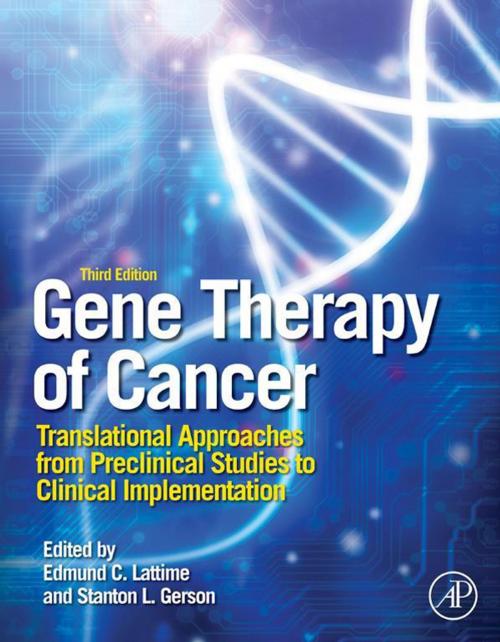Gene Therapy of Cancer
Translational Approaches from Preclinical Studies to Clinical Implementation
Nonfiction, Health & Well Being, Medical, Medical Science, Pharmacology, Science & Nature, Science, Biological Sciences, Genetics| Author: | ISBN: | 9780123946324 | |
| Publisher: | Elsevier Science | Publication: | August 28, 2013 |
| Imprint: | Academic Press | Language: | English |
| Author: | |
| ISBN: | 9780123946324 |
| Publisher: | Elsevier Science |
| Publication: | August 28, 2013 |
| Imprint: | Academic Press |
| Language: | English |
Gene therapy as a treatment for cancer is at a critical point in its evolution. Exciting new developments in gene targeting and vector technology, coupled with results from the first generation of preclinical and clinical studies have led to the design and testing of new therapeutic approaches. The Third Edition of Gene Therapy of Cancer provides crucial updates on the basic and applied sciences of gene therapy. It offers a comprehensive assessment of the field including the areas of suicide gene therapy, oncogene and suppressor gene targeting, immunotherapy, drug resistance gene therapy, and the genetic modification of stem cells. Researchers at all levels of development, from basic laboratory investigators to clinical practitioners, will find this book to be instructive.
Cancer gene therapy, like cancer therapy in general, is evolving rapidly, testing new concepts, targets and pathways, evoking new technologies, and passing new regulatory hurdles. Its essence, however, has not changed: the hope and challenges of returning altered genes to normal, using targeted gene expression to alter the function of both tumor and microenvironment, and in some cases normal cells, and delivering functionally important genes to specific cell types to increase sensitivity to killing or to protect normal cells from cancer therapies.
In some instances, gene therapy for cancer forms a continuum from gene repair through the use of molecularly modified cells; the use of viral and non-viral vector based gene delivery to both tumor and tumor microenvironment; the use of viral and gene based vaccines; and development of new gene-based therapeutics. The unique mechanistically chosen vector platforms are at the heart of this technology because they allow for direct and selective cell death and transient to sustained delivery of vaccine molecules or molecules that affect the microenvironment, vasculature, or the immune response.
- Explains the underlying cancer biology necessary for understanding proposed therapeutic approaches
- Presents in-depth description of targeting systems and treatment strategies
- Covers the breadth of gene therapy approaches including immunotherapeutic, drug resistance,oncolytic viruses, as well as regulatory perspectives from both the NCI and FDA
Gene therapy as a treatment for cancer is at a critical point in its evolution. Exciting new developments in gene targeting and vector technology, coupled with results from the first generation of preclinical and clinical studies have led to the design and testing of new therapeutic approaches. The Third Edition of Gene Therapy of Cancer provides crucial updates on the basic and applied sciences of gene therapy. It offers a comprehensive assessment of the field including the areas of suicide gene therapy, oncogene and suppressor gene targeting, immunotherapy, drug resistance gene therapy, and the genetic modification of stem cells. Researchers at all levels of development, from basic laboratory investigators to clinical practitioners, will find this book to be instructive.
Cancer gene therapy, like cancer therapy in general, is evolving rapidly, testing new concepts, targets and pathways, evoking new technologies, and passing new regulatory hurdles. Its essence, however, has not changed: the hope and challenges of returning altered genes to normal, using targeted gene expression to alter the function of both tumor and microenvironment, and in some cases normal cells, and delivering functionally important genes to specific cell types to increase sensitivity to killing or to protect normal cells from cancer therapies.
In some instances, gene therapy for cancer forms a continuum from gene repair through the use of molecularly modified cells; the use of viral and non-viral vector based gene delivery to both tumor and tumor microenvironment; the use of viral and gene based vaccines; and development of new gene-based therapeutics. The unique mechanistically chosen vector platforms are at the heart of this technology because they allow for direct and selective cell death and transient to sustained delivery of vaccine molecules or molecules that affect the microenvironment, vasculature, or the immune response.
- Explains the underlying cancer biology necessary for understanding proposed therapeutic approaches
- Presents in-depth description of targeting systems and treatment strategies
- Covers the breadth of gene therapy approaches including immunotherapeutic, drug resistance,oncolytic viruses, as well as regulatory perspectives from both the NCI and FDA















